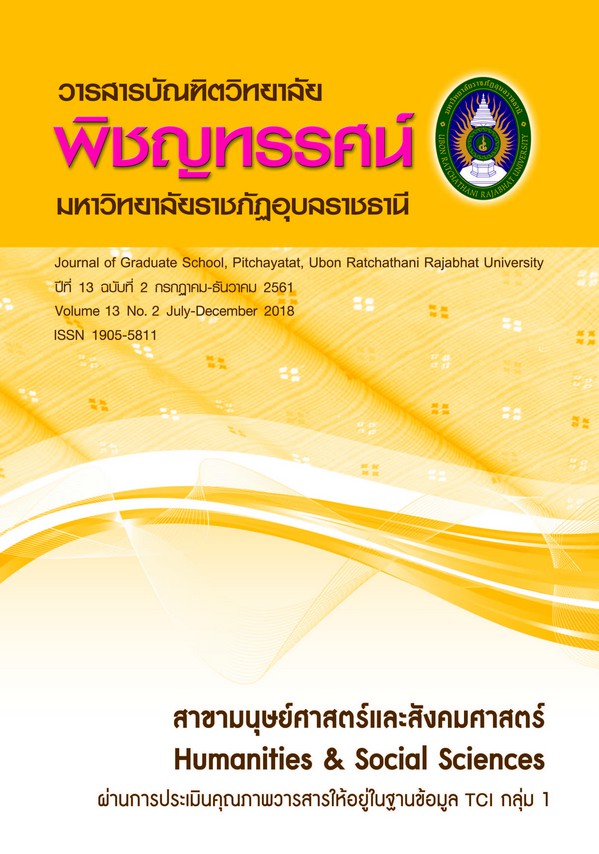แนวทางการส่งเสริมการเรียนรู้ตลอดชีวิตของผู้สูงอายุในภาคตะวันออกเฉียงเหนือ
คำสำคัญ:
ผู้สูงอายุ, การเรียนรู้ตลอดชีวิต, การส่งเสริมการเรียนรู้บทคัดย่อ
การวิจัยครั้งนี้มีวัตถุประสงค์เพื่อศึกษาแนวทางการส่งเสริมการเรียนรู้ตลอดชีวิตของผู้สูงอายุในภาคตะวันออกเฉียงเหนือ กลุ่มเป้าหมายที่ใช้ในการวิจัยครั้งนี้ได้แก่ ผู้ที่มีส่วนเกี่ยวข้องในการส่งเสริมการเรียนรู้ตลอดชีวิตของผู้สูงอายุในภาคตะวันออกเฉียงเหนือ รวมจำนวน 33 คน เครื่องมือที่ใช้ในการเก็บรวบรวมข้อมูลเป็นแบบสัมภาษณ์ การวิเคราะห์ข้อมูลใช้วิธีวิเคราะห์เนื้อหา ผลการวิจัยพบว่า แนวทางการส่งเสริมการเรียนรู้ตลอดชีวิตของผู้สูงอายุในภาคตะวันออกเฉียงเหนือของไทยควรมีดังนี้ 1) ด้านสุขภาพกาย ควรส่งเสริมเรียนรู้จากการร่วมปฏิบัติงานกับทีมบุคลากรด้านสุขภาพ การเรียนรู้เรื่องการปรับเปลี่ยนพฤติกรรมสุขภาพจากสื่อประเภทต่างๆ โดยเฉพาะสื่อออนไลน์ การจัดกิจกรรมให้ความรู้เกี่ยวกับวิธีการดูแลสุขภาพตนเองแบบการแพทย์ทางเลือก 2) ด้านจิตใจ ควรจัดกิจกรรมการอบรมให้ความรู้ และทัศนศึกษาดูงานของผู้สูงอายุ จัดกิจกรรมการเรียนรู้มีลักษณะบูรณาการแบบสอดแทรกความบันเทิง ได้รับความรู้เพิ่มขึ้นด้วย จัดกิจกรรมการเรียนรู้สำหรับผู้สูงอายุที่ไม่เน้นหนักด้านวิชาการมากเกินไป ควรเน้นการพักผ่อนหย่อนใจ กิจกรรมที่ช่วยคลายความเหงา ความโดดเดี่ยว ความเบื่อ ควรต้องเน้นเรื่องจิตใจเป็นสำคัญผ่านทางการศึกษาตามอัธยาศัย 3) ด้านความสัมพันธ์ทางสังคม ควรจัดการเรียนรู้ที่ผสมผสานการจัดการศึกษาในระบบโรงเรียน การศึกษานอกระบบโรงเรียน และการศึกษาตามอัธยาศัยแบบบูรณาการ จัดกิจกรรมการแลกเปลี่ยนเรียนรู้ระหว่างกลุ่มผู้สูงอายุ ส่งเสริมเรื่องการมีภาคีเครือข่ายเพื่อการเรียนรู้ระหว่างกลุ่มและส่งเสริมให้มีแกนนำผู้สูงอายุ เพื่อเป็นแกนนำในการจัดกิจกรรมการเรียนรู้ โดยในการดำเนินงานด้านต่าง ๆ ควรใช้หลักการมีส่วนร่วมของสมาชิกทุกคนในชุมชนร่วมกันดูแลสมาชิกในชุมชนที่เป็นผู้สูงอายุ 4) ด้านเศรษฐกิจและรายได้ ควรจัดให้มีการเรียนรู้เรื่องสวัสดิการและสิทธิประโยชน์ที่เกี่ยวข้องกับผู้สูงอายุ สิทธิพื้นฐานของผู้สูงอายุ กองทุนผู้สูงอายุและกฎหมายที่เกี่ยวข้องกับผู้สูงอายุที่ผู้สูงอายุควรจะได้รับรู้ องค์กรปกครองส่วนท้องถิ่นควรจัดให้มีโครงการที่ให้ความรู้เกี่ยวกับการดูแลคุณภาพชีวิตทางด้านเศรษฐกิจของผู้สูงอายุ จัดการศึกษาและการเรียนรู้สำหรับผู้สูงอายุในลักษณะที่เป็นหลักสูตรประกอบอาชีพระยะสั้นหรือลักษณะที่เป็นการศึกษาเรียนรู้เพื่อเสริมรายได้อย่างอิสระตามความสนใจ โดยใช้ทรัพยากรที่มีอยู่ในท้องถิ่นให้เกิดประโยชน์ เพื่อเป็นช่องทางการเพิ่มพูนและเสริมรายได้
เอกสารอ้างอิง
นภาพร ชโยวรรณ. รายงานการสำรวจสภาวะผู้สูงอายุในประเทศไทย. กรุงเทพฯ:สำนักงานคณะกรรมการวิจัยแห่งชาติ, 2539.
พิทักษ์ ทองสุขและคณะ. การเรียนรู้ตลอดชีวิตของผู้สูงอายุในเขตเทศบาลตำบลมะขามเตี้ยอำเภอบางละมุง จังหวัดชลบุรี. ตาก: วิทยาลัยนอร์ทเทิร์นตาก, 2558.
มูลนิธิสถาบันวิจัยและพัฒนาผู้สูงอายุ. แผนกลยุทธ์ด้านการทำงานของผู้สูงอายุ. กรุงเทพฯ: สำนักงานกองทุนสนับสนุนการสร้างเสริมสุขภาพ, 2559.
รายงานสถานการณ์ผู้สูงอายุไทย พ.ศ. 2550. กรุงเทพฯ: มูลนิธิสถาบันวิจัยและพัฒนาผู้สูงอายุไทย, 2550.
ศศิพัฒน์ ยอดเพชร, ภาวนา พัฒนศรีและธนิกานต์ คิดการ. การถอดบทเรียนตัวอย่างที่ดีของโรงเรียนและชุมชนผู้สูงอายุ. กรุงเทพพฯ: มูลนิธิสถาบันวิจัยและพัฒนาผู้สูงอายุ, 2559.
ษากุล สินไชย. การสังเคราะห์ข้อมูลการดำเนินงานด้านผู้สูงอายุ. กรุงเทพฯ: มูลนิธิสถาบันวิจัยและพัฒนาผู้สูงอายุ, 2557.
สถิติผู้สูงอายุในภาคตะวันออกเฉียงเหนือ.กรุงเทพฯ: สำนักงานสถิติแห่งชาติ, 2558.
สุมาลี สังข์ศรี. บทบาทของสตีไทยในชนบทในการส่งเสริมการศึกษาตลอดชีวิต. นนทบุรี:มหาวิทยาลัยสุโขทัยธรรมาธิราช, 2544.
อาชัญญา รัตนกุล. การศึกษาสภาพปัญหา ความต้องการและรูปแบบการจัดกิจกรรมการศึกษานอกระบบและการศึกษาตามอัธยาศัยเพื่อส่งเสริมการเรียนรู้ด้านการเตรียมความพร้อมเมื่อเข้าสู่วัยผู้สูงอายุของผู้ใหญ่วัยแรงงาน. กรุงเทพฯ: คณะครุศาสตร์ จุฬาลงกรณ์มหาวิทยาลัย, 2553.
ดาวน์โหลด
เผยแพร่แล้ว
รูปแบบการอ้างอิง
ฉบับ
ประเภทบทความ
สัญญาอนุญาต
บทความทุกเรื่องได้รับการตรวจความถูกต้องทางวิชาการโดยผู้ทรงคุณวุฒิภายนอกอย่างน้อย 3 คน ความคิดเห็นในวารสารพิชญทรรศน์เป็นความคิดเห็นของผู้นิพนธ์มิใช่ความคิดเห็นของผู้จัดทำ จึงมิใช่ความรับผิดชอบของวารสารพิชญทรรศน์ และบทความในวารสารพิชญทรรศน์สงวนสิทธิ์ตามกฎหมายไทย การจะนำไปเผยแพร่ต้องได้รับอนุญาตเป็นลายลักษณ์อักษรจากกองบรรณาธิการ





